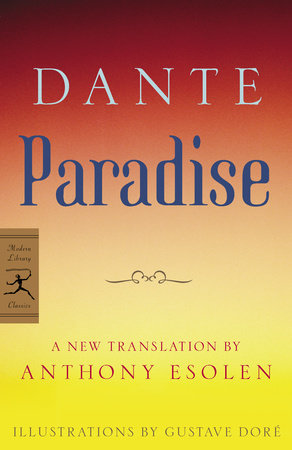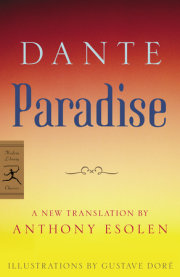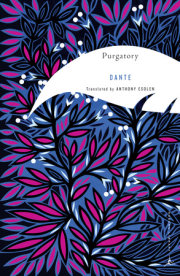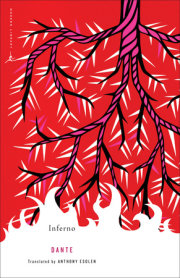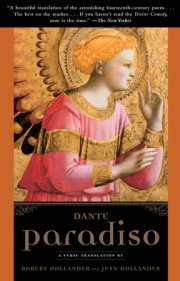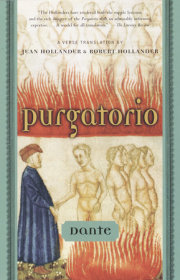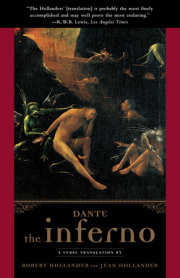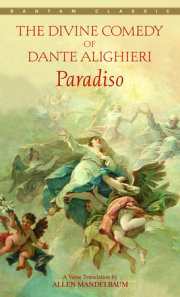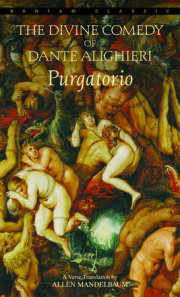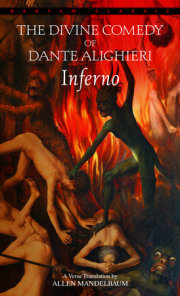Canto One
Dante and Beatrice are at the threshold of Heaven. She explains to him
that it is the nature of the human soul to rise.
The glory of the One who moves all things
penetrates the universe with light,
more radiant in one part and elsewhere less:
I have been in that heaven He makes most bright,4
and seen things neither mind can hold nor tongue
utter, when one descends from such great height,
For as we near the One for whom we long,7
our intellects so plunge into the deep,
memory cannot follow where we go.
Nevertheless what small part I can keep10
of that holy kingdom treasured in my heart
will now become the matter of my song.
O good Apollo, for this last work of art,13
make me as fit a vessel of your power
as you demand when you bestow the crown
Of the beloved laurel. Till this hour16
one peak of twin Parnassus has sufficed,
but if I am to enter the lists now
I shall need both. Then surge into my breast19
and breathe your song, as when you drew the vain
Marsyas from the sheath of his own limbs.
Father, virtue divine, should you but deign22
that I make manifest a shadow of
the blessed kingdom sealed upon my brain,
At the foot of that tree whose wood you love25
you’ll see me stand and crown my brows with green,
made worthy by the subject, and by you.
Poets and Caesars now so rarely glean28
those leaves to celebrate a victory
(man’s fault and shame, for our desires are mean),
the Peneian branches must give birth to joy31
when any man should thirst for their high fame,
in the glad heart of the Delphic deity.
A little spark gives birth to a great flame.34
Better voices perhaps will follow mine,
praying to hear what Cyrrha shall proclaim!
By various spills of light the sun will shine37
dawning upon the world of men that die,
but at the three-cross intersection of
Four rings it rises in the company40
of a more favorable time of year,
happier stars, to stamp this worldly clay
With its most perfect seal. One hemisphere43
lay brightening in that stream and one grew dim,
as it made morning there and evening here,
When I saw Beatrice turn upon her left46
and look to Heaven to gaze into the sun:
no eagle ever held a gaze so firm.
As a reflecting ray will follow upon49
the first and in a glance, an instant, rise
just like a pilgrim longing to turn home,
So she instilled her gazing–through my eyes–52
into my powers of fancy, and I too
stared at the sun more than our sight can bear.
With our weak powers on earth one may not do55
what there one may–thanks to the special place
created as the proper home for man.
Not long could I sustain the brilliant rays58
before they seemed to flash like sparks that play
round steel still white-hot from the forge’s blaze,
And suddenly it seemed that day and day61
were fused, as if the One who wields the might
adorned the heavens with a second sun.
Into the everlasting wheels of light64
Beatrice gazed with silent constancy;
on her I gazed, far from that central sight.
Her countenance had the same effect in me67
as did the plant that Glaucus tasted when
it made him share the godhood of the sea.
To signify man’s soaring beyond man70
words will not do: let my comparison
suffice for them for whom the grace of God
Reserves the experience. If I bore alone73
that part of me which you created last,
O Love that steers the heavens, you surely know,
For your light lifted me. And when the vast76
wheel you have made eternal by desire
held me intent to hear the harmony
You tune in all its parts, the sunlight-fire79
lit so much of the sky, no flooding stream
or rain could ever fill so broad a lake.
The newness of the sound, the swelling gleam82
lighted desire in me to learn their cause–
keener than any appetite I’d known.
And she, who saw within me what I was,85
to still the troubled waters of my soul,
opened her lips before I could inquire,
And thus began: “You’re making your mind dull88
with false imagining–you don’t perceive
what you would see, if you could shake it off.
You are not on the earth, as you believe.91
Lightning that flees its proper realm is not
so swift as your returning to your own.”
I admit I was shorn of my first doubt94
by the brief words she flashed me with a smile,
but in another net my feet were caught:
“My first amazement is at peace–but still97
I am amazed that I should rise so high,
beyond the lightness of the air and fire.”
She turned her eyes to me then with a sigh100
of pity, as a mother in distress
whose child is ill and talks deliriously,
So she made matters plain: “All things possess103
order amongst themselves: this order is
the form that makes the world resemble God.
Thence the high beings read the signs, the trace106
of that eternal Power who is the end
for which the form is set in time and place.
All natures in this order lean and tend109
each in distinctive manner to its Source,
some to approach more near and others less–
Whence from their various ports all creatures move112
on the great sea of being, with each one
ferried by instinct given from above.
This is what makes the fire rise toward the moon;115
this, the prime mover of the mortal heart;
this makes the heavy earth condense in one;
Nor does this bow with target-cleaving art118
strike only things that lack intelligence,
but beings made with intellect and love.
The glorious world-ordaining providence121
forever stills the highest heaven with light,
beyond the spinning of the swiftest sphere,
And to that place as to our destined site124
we’re speeded by the power of that cord
shooting each arrow in its happy flight.
Often it’s true a form may not accord127
with the intent of him who works the art
because the matter’s deaf and won’t respond:
So, from this course, a creature may depart130
if it should have the power, despite the push,
to swerve away and veer off from its start,
And as you’ll see a fall of lightning flash133
from the high clouds, so cheating pleasures skew
that first urge, and they plunge it to the earth.
No more amazement should it bring to you136
that you ascend, than if a mountain stream
should tumble rushing to the plains below.
But it would be a cause of just surprise139
if, free of every bar, you should remain
like a still flame on earth, and not arise.”
Then to the heavens she turned her gaze again.142
Copyright © 2004 by Dante. All rights reserved. No part of this excerpt may be reproduced or reprinted without permission in writing from the publisher.

